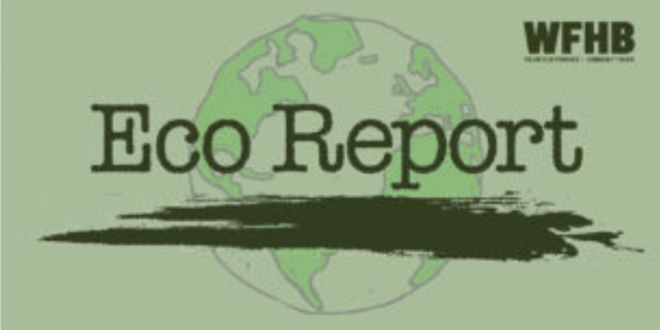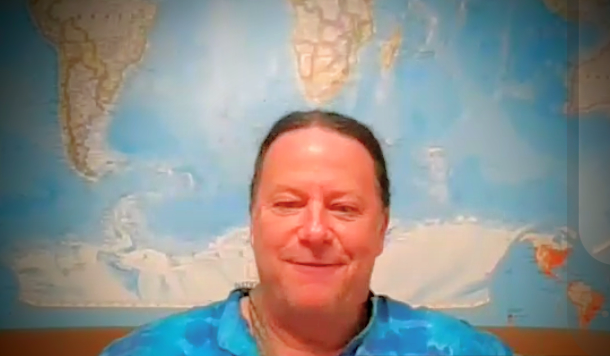Podcast: Play in new window | Download (Duration: 29:11 — 26.8MB)
Subscribe: RSS
| Hello and welcome to Eco-Report. For WFHB, I’m Julianna Dailey And I’m Katrine Bruner. In this edition of Eco Report, Environmental Correspondent Zyro Roze talks with Jeff Mease, CEO of One World Enterprises, about the measures taken to make a set of local food service companies more environmentally responsible. |
|
And now for your environmental reports: Electrocution isn’t the main thing killing birds along power lines, according to the New York Times. A survey of power lines in four Western states found bullet fragments and shotgun pellets in most of the dead birds that were collected. Birds get electrocuted on power lines. But people shooting at birds perched on power poles may be even more of a problem. In a survey of five sites in the western United States, two-thirds of birds found dead beneath power lines had been shot. Avians found dead along power lines are often assumed to have died from electrocution, especially if their bodies show burns or singeing, said Eve Thomason, a wildlife biologist at Boise State University in Idaho. But the animal may have been injured or killed before getting zapped. In the new study, published in the journal Science, Ms. Thomason and her colleagues walked along 122 miles of power lines in Idaho, Oregon, Utah and Wyoming, collecting 410 bird carcasses. Back in the lab, the researchers X-rayed the birds, looking for evidence of gunshot wounds or other trauma. —Norm Holy |
| Phoenix is enduring its hottest month on record, but mitigations could make the city’s heat waves less unbearable. Simple solutions like more trees, reflective pavements, smaller parking lots and lighter roofs could make the Valley of the Sun less prone to overheating in the future. The consequences are now making headlines around the world, with Phoenix reaching over 20 days straight of temperatures reaching 110 degrees Fahrenheit or higher—a new record. The city also recorded its highest low temperature ever last week, a not-so-comfortable 97 degrees, and will become the city’s hottest month ever.
The news is full of language saying hottest month ever. It’s true if the reference is to recorded temperatures, which date back to 1880. But before there were Homo Sapiens, there were millions of years on earth with temperatures 10 – 20 degrees F warmer than today. The atmospheric carbon dioxide was several times higher than today – all coming from volcanic eruptions. During most of earth’s existence, there was no ice at all on earth. One of the easiest ways to mitigate heat is to provide more shade in areas that need it, often by planting more trees. That idea is beginning to take root throughout the Phoenix metro area. Thus far, the golf courses are still using copious amounts of water, and 80 percent of the water from the Colorado River goes to agriculture. Leafy greens, cabbage, dates, melons, lemons, oranges, apples, potatoes and tomatoes are just some foods harvested from Arizona’s nourishing soil. The state also boasts a growing nut and date crop industry. High quality cotton, which requires a lot of water, is also a major crop. What is difficult to understand is the construction of a microchip plant that will employ about 30,000 people. That would add at least 200,000 people to the population. Arizona’s people are going to be exposed to even higher temperatures in the future. Temperatures over 120 F are life-threatening. —Norm Holy |
| The earliest evidence for human habitation in what is now the city of Paris dates from about 7600 BCE. By the end of the 3rd century BCE, a settlement had been built on the island, Île de la Cité; it was inhabited by a Gallic tribe known as the Parisii. The Seine River was full of salmon and sturgeon. The river began to decline seriously 500 years ago because butcher shops and tanneries on the island dumped their waste into the river.
Still, Paris is referred to as the City of Light and the City of Love, and, until 1923, it was also a city of swimming. That year, swimming was banned in the Seine due to excess sewage being drained into the river following heavy rainfall, rendering the iconic river unsafe. An exception to the ban was the swimming competition, Traversée de Paris à la Nage, which continued into the 1940s, according to Paris Unlocked. Paris is gearing up for the Summer Olympic Games next year and is in the final phase of a decade-long, $1.6 billion project to restore the Seine and make it swimmable once again, reported BBC News and France 24. —Norm Holy |
| EcoWatch reports that olive harvests are expected to face a second challenging year in a row as heat waves threaten crops across Europe. This year’s heat waves arrived a month earlier than the first heat waves of last year’s hot, dry season, according to Earth.org. The first heat wave arrived in late April, following a warmer- and drier-than-usual March. The winter was also unusually warm. During the first heat wave of 2023, the trees were just beginning to flower, putting them in a vulnerable position.
Spain, the largest olive oil producer in Europe, has had its annual supply decline by half because of the heat and drought. Last year, heat waves caused the country’s olive oil production to decline from 1.48 million metric tons in 2021 to 2022 to just 660,000 metric tons from 2022 to 2023. Experts are predicting olive oil supply to reach 850,000 metric tons this year, still far below average, but continuing heat waves could impact the harvest. In Spain we already know it is going to be another bad year, but no one knows what’s currently happening. The record temperatures are not going to help the situation, according to Walter Zanre, the chief executive of the largest olive oil producer globally. (quote)I can’t share how much anxiety this is causing us. Last year, Spain came into crop with a bit of carry-over [from the year before], which negated the shortfall somewhat. This year the barrels are dry. Even if Spain produces the predicted 850,000 tonnes, the price situation is worse. (end quote) Spain isn’t alone. Other major olive oil-producing countries, such as Italy and Portugal, have experienced smaller yields because of the harsh conditions. Since June 2022, olive oil prices have surged in response to the poor olive harvests, as the crop has been affected by the extreme heat. Olive oil prices have hit over $6,000 per metric ton, the highest price this product has been since 1997, Weather.com reported. As The Guardian reported, consumers may expect to see shortages of olive oil in the fall, as last year’s supply is expected to run out in September, and the new supply for 2023 isn’t expected to be ready until November. Many crops are facing shortages amid the climate crisis. The current heat waves in Europe are also threatening vineyards, even putting types of grapes that have long been known to survive in extreme conditions at risk. Maturing tomatoes in Italy are at risk from blistering in the extreme temperatures, and these crops were already impacted by severe floods earlier this year. —Norm Holy |
| And now, we turn to Zyro Roze and his conversation with Jeff Mease of One World Enterprises on ways that he has worked to prevent pollution, reduce waste and implement green practices as standard policy among a family of local food businesses.
. Jeff Mease, Founder/CEO of One World Enterprises
Photo Courtesy of Eco Media Center of Monroe County
 Courtesy of One World Enterprises |
For Eco-Report, I am Julianna Dailey. And, I am Noelle. Are you looking for a way to make a difference on environmental issues? Here at EcoReport we are currently looking for reporters, engineers, and segment producers. Our goal is to report facts on how we’re all affected by global climate disruption and the ongoing assaults on our air, land and water. We also celebrate ecologists, tree huggers, soil builders and an assortment of champions who actively protect and restore our natural world, particularly those who are active in south central Indiana. All levels of experience and all ages are welcome, and we provide the training you’ll need. WFHB also offers internships. To volunteer for Eco-Report, give us a call at (812) 323-1200, or e-mail us at: [email protected].
|
And now for some upcoming events: Happening right now, the Artist for Environmental Restoration are having an opening reception of their visual arts exhibition, Sea Change, a Collective Exhibition about our natural world at Backspace Gallery on 6th Street from 5 to 8 pm, today! |
| Drop by the Paynetown State Recreation Area at Monroe Lake to do some Cloud Watching on Saturday, September 2nd, from 6 to 7:30 pm. Meet at the Campground Playground to cloud-gaze and learn what different types of clouds can tell us about weather changes. |
| A National Wildlife Day Talk and Walk will take place at Spring Mill State Park on Monday, September 4th, from 11 to 11:45 am. Meet the naturalist at the Lakeview Activity Center for a brief presentation and then take a short hike near the lake shoreline to look for wildlife. |
| A Trees From Seed presentation by Ray Major is scheduled for Brown County State Park on Thursday, September 7th, from 2 to 3 pm. Meet at the Friends’ Shelter House to join Ray, the man behind the “Trees From Seed” social media movement for an informative session on growing trees. |
| Learn about Owls: Nighttime Hunters at the Paynetown Recreation Area at Monroe Lake on Saturday, September 9th, from 2 to 3:30 pm. Meet at the Activity Center Patio to discover how owls are uniquely adapted to being nocturnal hunters and find out which owls call Indiana home. |
| And that wraps up our show for this week. EcoReport is brought to you in part by M-P-I Solar, a Bloomington business specializing in solar hot water, solar electricity and solar hot air systems. M-P-I Solar designs and installs solar power generation systems that encourage independence and individual responsibility. Found locally at 812-334-4003 and on the web at MPIsolarenergy.com. |
| This week’s headlines were written by Norm Holy. Today’s news feature was produced by Zyro Roze and edited by Noelle Herhusky-Schneider. Julianna Dailey assembled the script which was edited by Zyro Roze. Julianna Dailey compiled our events calendar. Kade Young and Noelle Herhusky-Schneider produced today’s show. Branden Blewett is our engineer. For WFHB, I’m Julianna Dailey. And I am Katrine Bruner. And this is Eco Report. |
 WFHB Bloomington Community Radio
WFHB Bloomington Community Radio



